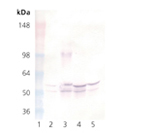Replaces Prod. #: ALX-804-178
Product Details
| Alternative Name: | Glycogen synthase kinase-3α/β |
| |
| Clone: | 1H8 |
| |
| Host: | Mouse |
| |
| Isotype: | IgG2b |
| |
| Immunogen: | Recombinant Xenopus GSK-3β. |
| |
| UniProt ID: | Q91757 |
| |
| Source: | Purified from mouse ascites. |
| |
| Species reactivity: | Human, Mouse, Rat
Bovine, Dog, Hamster, Monkey, Porcine, Rabbit, Sheep
|
| |
| Applications: | ICC, IHC, WB
|
| |
| Recommended Dilutions/Conditions: | Western Blot (1:1,000, colorimetric)
Suggested dilutions/conditions may not be available for all applications.
Optimal conditions must be determined individually for each application. |
| |
| Application Notes: | Detects bands of ~51 and ~47kDa by Western blot. |
| |
| Purity Detail: | Protein G affinity purified. |
| |
| Formulation: | Liquid. In PBS, pH 7.2, containing 50% glycerol and 0.09% sodium azide. |
| |
| Shipping: | Blue Ice |
| |
| Long Term Storage: | -20°C |
| |
| Scientific Background: | Glycogen Synthase Kinase 3β (GSK-3β) is a unique serine/threonine kinase that is inactivated by phosphorylation. In response to insulin binding, PKB/AKT phosphorylates GSK-3β on serine 9, which prevents GSK-3β from phosphorylating glycogen synthase. Unphosphorylated glycogen synthase is active and able to synthesize glycogen. GSK-3β is also unique in that it requires a substrate that has been phosphorylated by a distinct kinase before it can phosphorylate the substrate. This phosphate priming mechanism explains why phosphorylation of serine 9 inactivates GSK-3β. The phosphorylated serine binds to the GSK-3β priming phosphate position and prevents binding of alternative substrates. In addition to insulin signaling, GSK-3β participates in the Wnt signaling pathway, where it forms a complex with axin, beta-catenin and adenomatous polyposis coli (APC) protein. In the presence of Wnts, GSK-3β is unable to phosphorylate beta-catenin, which leads to stabilization of beta-catenin. The Wnt pathway inactivates GSK-3β via the proteins, Dishevelled and FRAT, which disrupt the interaction of GSK-3β with axin, beta-catenin, and APC. Clinically, there is considerable interest in GSK-3β inhibitors because they may mimic the effect of insulin or reduce the hyperphosphorylation of Tau that is observed in Alzheimer's Disease. |
| |
| Regulatory Status: | RUO - Research Use Only |
| |

Western blot analysis: Lane 1: MW marker, Lane 2: 20µg HeLa lysate (heat shocked), Lane 3: 20µg mouse brain lysate, Lane 4: 20µg rat brain lysate, Lane 5: 20µg RK-13 lysate.
Please mouse over
Product Literature References
Intracellular targets of paullones: identification following affinity purification on immobilized inhibitor: L. Meijer, et al. ; J. Biol. Chem.
277, 25493 (2002),
Application(s): WB using porcine & rat samples,
Abstract;
Related Products














